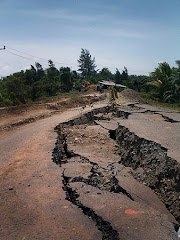1. Background:
The United Nations Human Settlements Programme, UN-HABITAT, is the United Nations agency for human settlements. It is mandated by the UN General Assembly to promote socially and environmentally sustainable communities, towns and cities with the goal of providing adequate shelter for all. The main documents outlining the mandate of the organization are the Vancouver Declaration on Human Settlements, Habitat Agenda, Istanbul Declaration on Human Settlements, the Declaration on Cities and Other Human Settlements in the New Millennium, and Resolution 56/206.
The agency has four main divisions which each oversee a set of programmes:
a.. The Regional and Technical Cooperation Division
b.. The Shelter and Sustainable Human Settlements Development Division
c.. The Monitoring and Research Division
d.. The Financing Human Settlement Division
The Regional Office for Asia and the Pacific (ROAP) of UN-HABITAT, in Fukuoka, Japan, serves the Asia and Pacific region in the implementation of the Habitat Agenda. The primary responsibility for the implementation and follow up of the Habitat Agenda rests with. The UN-HABITAT ROAP-Fukuoka provides support to individual governments and their national and local partners and monitors progress being made in the region.
Technical cooperation projects coordinated by the UN-HABITAT ROAP are geographically spread from Iran in the west to the Pacific Islands in the east, and span the entire spectrum of urbanisation and shelter development issues. Tasks currently being addressed range from rehabilitation of urban settlements in Afghanistan to strengthening housing finance institutions in Indonesia and reducing urban violence in Papua New Guinea; from poverty alleviation in Bangladesh to urban management in Cambodia and Vietnam; from community water supply and sanitation in Myanmar to city development strategies in Sri Lanka and the Philippines; from promoting urban-rural linkages in Nepal and Indonesia to environmental improvement of cities in India and China.
For many years, UN-HABITAT has provided Technical Assistance to the Indonesian Government, on issues of housing, urban development and land administration. In the past 10 years, it focused its support on issues of local governance and local economic development. A central objective in programmes such as KPEL (Partnership for Local Economic Development, 2001-2003) and SUF/Indonesia (Slum Upgrading Facility, on-going), is the provision of micro-credit for home improvements, community-level amenity upgrading and small-scale livelihoods initiatives. Water and sanitation has often been a key ingredient of these localised initiatives and of supporting City Development Strategies. For the implementation, UN-HABITAT and its partners have worked with many local government authorities, local micro-finance institutions and community groups.
Presently, UN-HABITAT is actively supporting the set-up of a network of municipal Housing Resource Centres, for the advocacy of community-based neighbourhood and housing development. UN-HABITAT is also completing the implementation of a large housing programme as part of the post-disaster reconstruction in Aceh and Nias, after the 2004 Tsunami. It again applied a process engaging beneficiary communities in the management of their own reconstruction work. In addition, it has been providing technical assistance not only to the governmental reconstruction agency (BRR) but also to local authorities and sub-district administrations. In the near future, UN-HABITAT will be assisting the Government to set up a national Habitat Secretariat, which will provide policy analysis, best practice communication and advocacy for pro-poor, participatory and environmentally sustainable urban development. The Habitat Secretariat will also promote knowledge exchange between Indonesia and other Asian countries, in particular ASEAN.
2. Scope of Work
The English Editor will assist in document editing (English language), as part of the closure of the programme.
3. Tasks
a.. To provide English language edits to the final documents of the Policy Unit, including the White Paper and the auxiliary documents.
b.. To provide English language edits to the subtitling to up to five training films.
c.. To provide language edits to final/closure documents of ANSSP
d.. To assist in the editing of documents related to activities aimed at the transfer of know-how to Indonesia, including:
-
UN-HABITAT Indonesia's input in the contingency plan of the Emergency Shelter Cluster, and to provide support by liaising with the cluster and the cluster head (IFRC) as directed by the Housing Policy Adviser
- The preparation of inputs to WUF 2008 (World Urban Forum, Nanjing, November 2008)
- The preparation of relevant inputs in the ASEAN networking of UN-HABITAT Indonesia, specifically in relation to the ASEAN Environment and Disaster Management Unit.
4. Duties and Responsibilities - General
The duties and responsibilities of the English Editor will include the following:
1. To report to the Housing Policy Manager.
2. To regularly liaise with the Indonesia Habitat Programme Manager, to keep him informed on activities in general, especially in relation to outreach to and contacts with external organisations.
5. Travel Requirements.
The Consultant is free to choose where to perform his tasks, as long as the output is delivered. The lumpsum payment includes travel expenses Kuala Lumpur - Jakarta - Kuala Lumpur.
6. Required Qualification and Work Experiences
a.. Preferably native english speaker
b.. Academic degree (planning, social sciences, political sciences or environmental management)
c.. Pre-knowledge on UN-HABITAT and ANSSP (www.unhabitat- indonesia. org)
d.. Excellent command of written English
e.. Knowledge of another official UN language is an asset
f.. Capable to independently ensure professional text editing of documents, especially studies and policy documents
g.. Basic computer skills
h.. Strong interpersonal skill that imparts confidence in peers and builds mutual respect with both national and international colleagues
i.. Ability to manage stress under intense work condition
j.. Willingness and ability to work with diverse local, national and multilateral institutions and with community groups
k.. Sound medical health, as the job requires frequent and extended travel inside the country, and often at short notice and without having the full benefit of well functioning transportation facilities and services
7. Deliverables and Payment Terms:
Deliverable Expected format/quantity Target Date Payment - % or proportion
Report of produced work CDrom End of contract 100%
Duly authorized travel between Jakarta and Banda Aceh will be considered official missions and paid by the programme, but no DSA claims will result from these.
Tuesday, July 1, 2008
Subscribe to:
Post Comments (Atom)



No comments:
Post a Comment